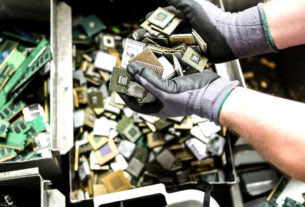By Bhalakatha
In agriculture, after the labor-intensive processes of sowing crops and irrigation, farmers often carry large 20-liter tanks of pesticides on their backs. This manual exercise of spraying pesticides on crops poses hazards to both the farmers’ health and the soil due to the widespread dispersion of the chemicals. Additionally, it leads to high labor costs for farmers, directly impacting their crop earnings.
To address these challenges in the agricultural sector, a Bengaluru-based startup known as Niqo Robotics has adopted robotics and artificial intelligence (AI) to make farming more efficient and cost-effective. Founded in 2015 by Jaisimha Rao, Niqo Robotics is dedicated to creating accessible and reliable robots for sustainable, long-term farming.
In August 2023, the company introduced its ‘AI-powered spot spray robots.’ These robots selectively spray agrochemicals only on the targeted plants, thereby minimizing chemical pollution of the soil and the farm’s ecosystems. Presently, more than 500 farmers in Maharashtra and Karnataka have adopted land-based robots to reduce input and labor costs.
Jaisimha Rao is committed to his mission of developing accessible and reliable robots for long-term and sustainable farming.
Jaisimha Rao’s Journey
Born in Tamil Nadu and raised in Kuwait in the Middle East, Jaisimha completed his graduation in electrical and computer engineering at Carnegie Mellon University in the USA. He then worked for a company in New York for seven years, gaining valuable experience.
“In my 20s, I enjoyed working abroad, but I realized that my future in a corporate job had limitations. I wanted to explore entrepreneurship,” says the 37-year-old.
At the age of 28, he made the bold decision to leave his well-paying job in the USA and return to his family in Karnataka. While his peers suggested he explore fintech entrepreneurship given his experience, Jaisimha wanted to keep his options open.
His journey took a turn when he accompanied his father to a coffee plantation on the outskirts of Bengaluru. There, he discovered that farmers practiced blanket spraying, which led to chemicals seeping unnecessarily into the soil.
“When I questioned these traditional methods, I received no scientific explanations. It surprised me how farmers had been following these practices for the past 50 years without scientific validation,” he recalls.
Further research revealed that food growing practices in India were predominantly manual, with critical decisions based on traditional wisdom rather than scientific data. Jaisimha realized the need to identify specific areas of the farm that required pesticide spraying.
With the advent of cameras and artificial intelligence, Jaisimha saw an opportunity to make precision agriculture a reality. In 2015, he founded Niqo Robotics with a vision to revolutionize Indian agriculture through innovation.
See, Select, and Spray
For the initial four years, Jaisimha worked with farmers across the country, using drones to capture images of farm sections affected by pests. He would then provide farmers with analytical reports.
“While these analytics were helpful, farmers did not consider them essential enough to pay for. They saw the reports as a nice-to-have rather than a must-have,” he notes.
Recognizing the need for a more actionable solution, Jaisimha developed land-based robots that not only analyzed farm conditions but also took necessary actions. These AI-based robots were trialed in the Akola district, Maharashtra, primarily among cotton farmers. Last month, the company formally launched 50 such robots for wider use.
The robots follow a three-step process: see, select, and spray. They utilize specialized day and night-vision cameras to identify plants, high-speed computers to select target plants, and precision nozzles to apply the appropriate amount of pesticides directly onto the plants.
“Our core technology is the camera attached to the sprayers. The cameras distinguish between plants and soil, signaling the nozzles to spray on plants and shutting off where there is soil,” Jaisimha explains.
Compared to blanket spraying of pesticides, using these robots can lead to significant cost savings for farmers, with potential savings of up to 60 percent on pesticide costs.
In conclusion, Niqo Robotics is making substantial progress in improving farming practices in India by leveraging technology to reduce costs, enhance efficiency, and minimize the environmental impact of pesticide use.





